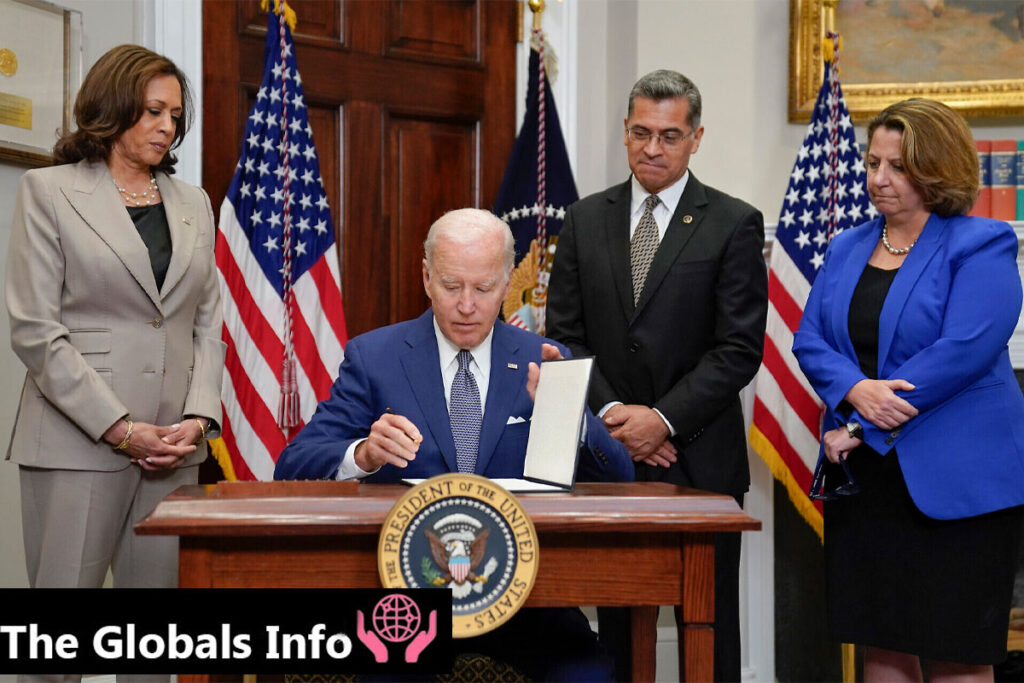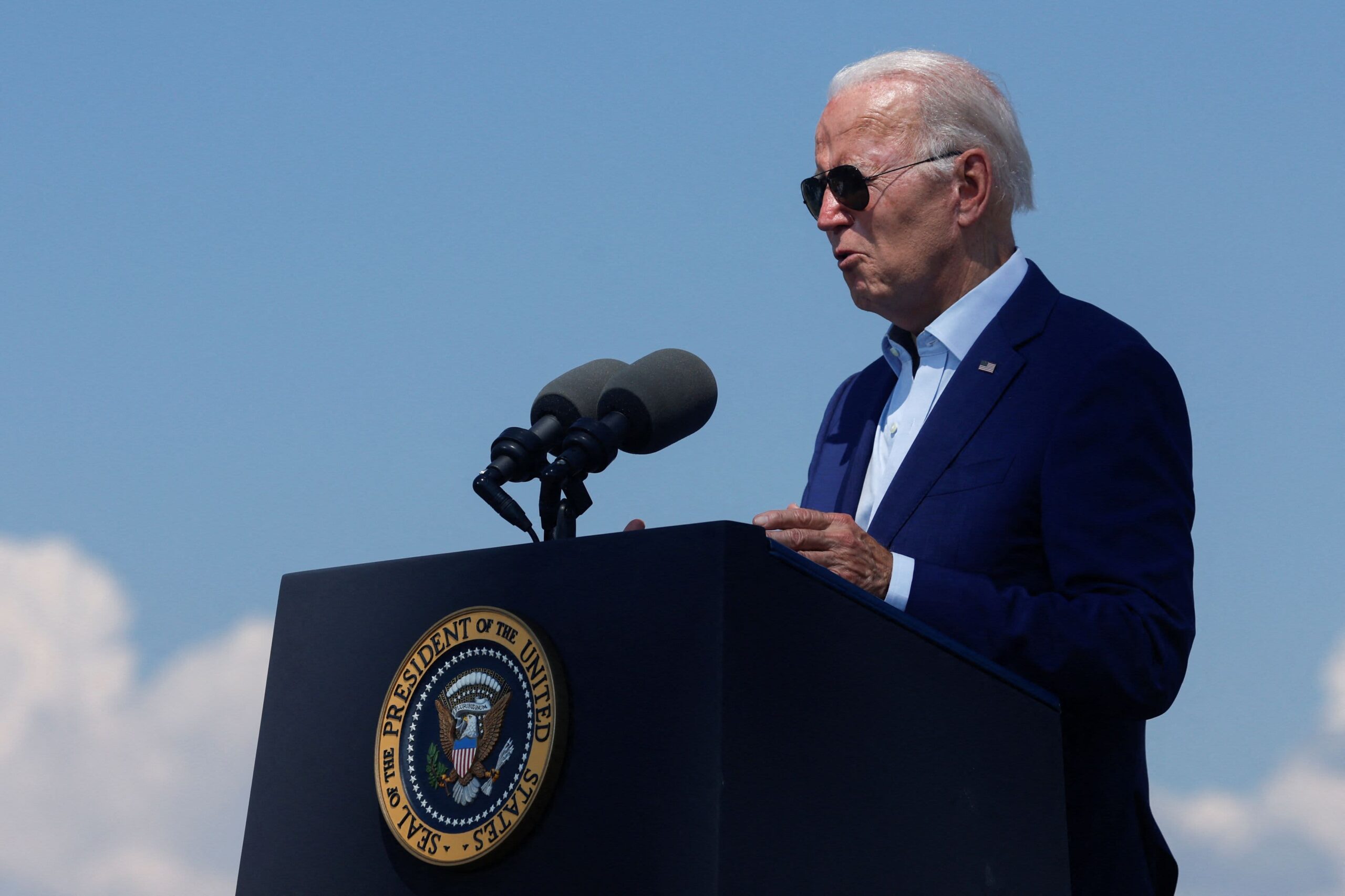President Biden Signs Landmark Infrastructure Bill into Law
President Biden signed the landmark infrastructure bill into law on November 15, 2023, marking a significant milestone in his administration’s agenda. The bill, officially titled the “Infrastructure Investment and Jobs Act,” represents a historic investment in America’s infrastructure, totaling $1.2 trillion over eight years.
At the heart of the legislation is a commitment to rebuilding the nation’s roads, bridges, and highways, addressing years of neglect and deterioration. The bill allocates $110 billion for roads and bridges alone, aiming to modernize 20,000 miles of highways and repair the most economically significant bridges in need of reconstruction.
Another major focus of the bill is expanding access to high-speed internet across rural and underserved communities. With an investment of $65 billion, the legislation aims to ensure that all Americans have affordable access to reliable broadband, bridging the digital divide that has long disadvantaged rural areas.
The infrastructure bill also prioritizes addressing climate change and enhancing resilience against natural disasters. It includes $47 billion for improving the nation’s resilience to wildfires, floods, and hurricanes, as well as funding for clean energy projects and electric vehicle infrastructure. This marks a significant step towards achieving President Biden’s climate goals, emphasizing sustainability and reducing carbon emissions.
Furthermore, the legislation includes substantial investments in public transportation, with $39 billion allocated to modernize transit systems and make them more accessible and environmentally friendly. This funding aims to improve mobility options, reduce traffic congestion, and lower greenhouse gas emissions from transportation.
The bill’s passage represents a bipartisan effort, with support from both Democrats and Republicans in Congress. It reflects a recognition of the urgent need to invest in America’s aging infrastructure to spur economic growth, create millions of jobs, and enhance the country’s competitiveness globally.
President Biden hailed the passage of the bill as a historic achievement that will benefit Americans for generations to come. In his remarks at the signing ceremony, he emphasized the transformative impact of the investments in infrastructure, describing them as essential to rebuilding the backbone of the nation and preparing it for the challenges of the 21st century.
Critics, however, have raised concerns about the bill’s cost and its potential impact on inflation. Some have also questioned whether the allocated funds will be effectively and efficiently spent, highlighting the need for strong oversight and accountability measures.
The signing of the infrastructure bill into law represents a major legislative victory for President Biden and a significant investment in America’s future. It addresses critical infrastructure needs, promotes economic growth, and advances environmental and climate resilience goals. As implementation begins, the focus will now shift to ensuring that the promised benefits reach communities across the country and that the investments are managed responsibly.
Biden Administration Announces New Climate Initiatives at Global Summit
In a pivotal moment for global climate action, the Biden administration unveiled new initiatives at the Global Climate Summit held on April 22, 2024. The summit, convened in Washington, D.C., brought together leaders from around the world to accelerate efforts to combat climate change and achieve the goals set forth in the Paris Agreement.
Central to the Biden administration’s announcements was a commitment to significantly reduce greenhouse gas emissions by 2030. Building upon the administration’s previous climate initiatives, including rejoining the Paris Agreement early in President Biden’s tenure, these new measures aim to strengthen America’s role as a leader in the fight against climate change.
One of the key initiatives outlined is the Clean Energy Standard, which sets ambitious targets for increasing the share of renewable energy sources in the nation’s electricity mix. The administration aims to achieve 80% clean electricity by 2030, a goal that underscores its commitment to transitioning away from fossil fuels and toward sustainable energy sources such as wind, solar, and hydropower.
In addition to promoting clean energy, the Biden administration announced investments in climate resilience and adaptation measures. This includes funding for infrastructure projects designed to withstand the impacts of climate change, such as sea-level rise, extreme weather events, and wildfires. By bolstering resilience efforts, the administration seeks to protect vulnerable communities and minimize the economic and social costs of climate-related disasters.
The summit also highlighted international collaboration as a cornerstone of effective climate action. President Biden reaffirmed the United States’ commitment to working closely with other countries to address global climate challenges, including through technology sharing, capacity building, and financial support for developing nations.
The administration emphasized the importance of addressing environmental justice and equity in climate policies. Recognizing that marginalized communities often bear the brunt of environmental degradation and climate impacts, the Biden administration pledged to prioritize equity in its climate initiatives, ensuring that benefits of clean energy and resilience investments reach all Americans, particularly those most affected by pollution and climate change.
Critics of the administration’s climate agenda have raised concerns about the feasibility and cost of implementing these ambitious initiatives. Some argue that transitioning to clean energy at such a rapid pace could lead to job losses in traditional energy sectors, while others question the effectiveness of government subsidies and incentives for renewable energy development.
Despite these challenges, the Biden administration remains steadfast in its commitment to combatting climate change as a top priority. By leveraging innovation, international cooperation, and equitable policy solutions, the administration aims to position the United States as a global leader in climate action while fostering economic growth and job creation in clean energy industries.
As the world continues to grapple with the urgent threats posed by climate change, the Biden administration’s initiatives announced at the Global Climate Summit represent a critical step forward in addressing this existential challenge and safeguarding the planet for future generations.
Biden Faces Congressional Opposition on Voting Rights Legislation
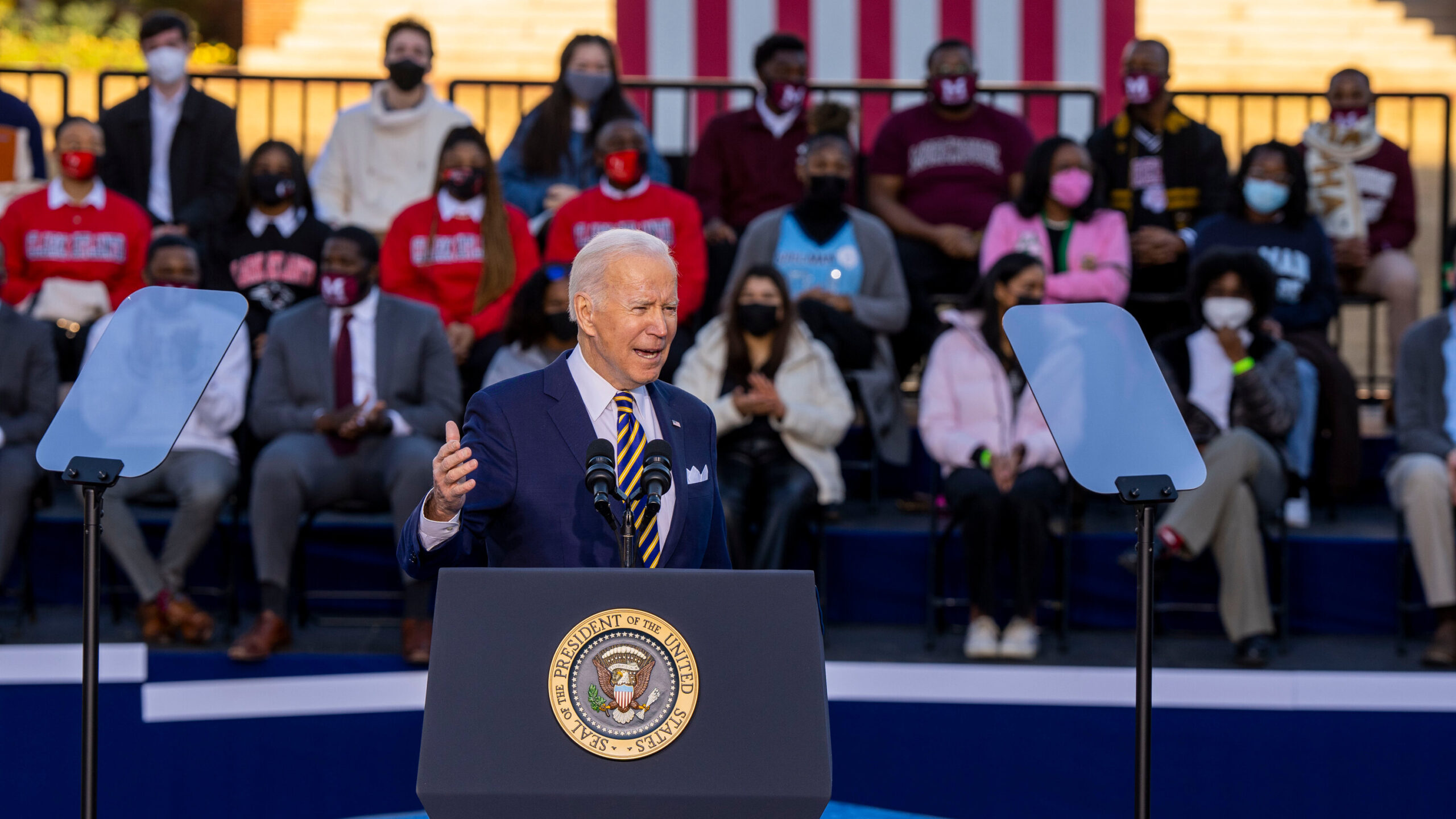
President Biden’s efforts to advance voting rights legislation have encountered significant opposition in Congress, reflecting a contentious political landscape and deep partisan divisions over electoral reforms.
The administration has been advocating for the passage of two key bills: the Freedom to Vote Act and the John Lewis Voting Rights Advancement Act. These bills aim to protect voting rights, expand access to the ballot box, and address voting restrictions implemented by several states in recent years.
The Freedom to Vote Act proposes sweeping reforms, including automatic voter registration, expanded early voting, and measures to curb partisan gerrymandering. It seeks to counteract state-level laws that critics argue disproportionately affect minority and marginalized communities, potentially suppressing voter turnout.
Similarly, the John Lewis Voting Rights Advancement Act aims to restore and strengthen provisions of the Voting Rights Act of 1965, which was weakened by a Supreme Court decision in 2013. The act would require certain states and localities with a history of voter discrimination to obtain federal approval before implementing new voting laws or procedures.
Despite strong support from Democratic lawmakers and voting rights advocates, both bills have faced staunch opposition from Republicans in Congress. GOP leaders argue that the proposed legislation represents federal overreach into state election laws and could undermine election integrity measures enacted at the state level.
The partisan divide has been particularly evident in the Senate, where procedural hurdles such as the filibuster have complicated efforts to advance voting rights legislation. Democrats have sought to overcome these obstacles by advocating for filibuster reform or carve-outs specifically for voting rights bills, but they have been unable to secure the necessary support from all members of their caucus.
President Biden has been a vocal advocate for voting rights, framing the issue as a fundamental democratic principle and a civil rights imperative. He has urged Congress to take action swiftly, warning that failure to pass meaningful voting rights legislation could jeopardize the fairness and integrity of future elections.
In response to congressional gridlock, voting rights advocates have intensified their efforts to mobilize public support and pressure lawmakers to prioritize electoral reforms. Organizations such as the NAACP, ACLU, and Fair Fight Action have launched grassroots campaigns, legal challenges, and voter education initiatives to raise awareness about voting rights issues and push for legislative action.
Looking ahead, the fate of voting rights legislation remains uncertain as political dynamics continue to evolve. President Biden and Democratic leaders in Congress are facing mounting pressure to find a viable path forward, whether through negotiations with Republicans, procedural changes in the Senate, or alternative legislative strategies.
The outcome of these efforts will have profound implications for the future of American democracy, influencing electoral processes, representation, and access to the voting booth for millions of Americans. As the debate over voting rights continues to unfold, the nation confronts critical questions about the balance between federal authority and state autonomy in shaping election laws and safeguarding democratic principles.
President Biden Visits Europe to Strengthen Transatlantic Alliances
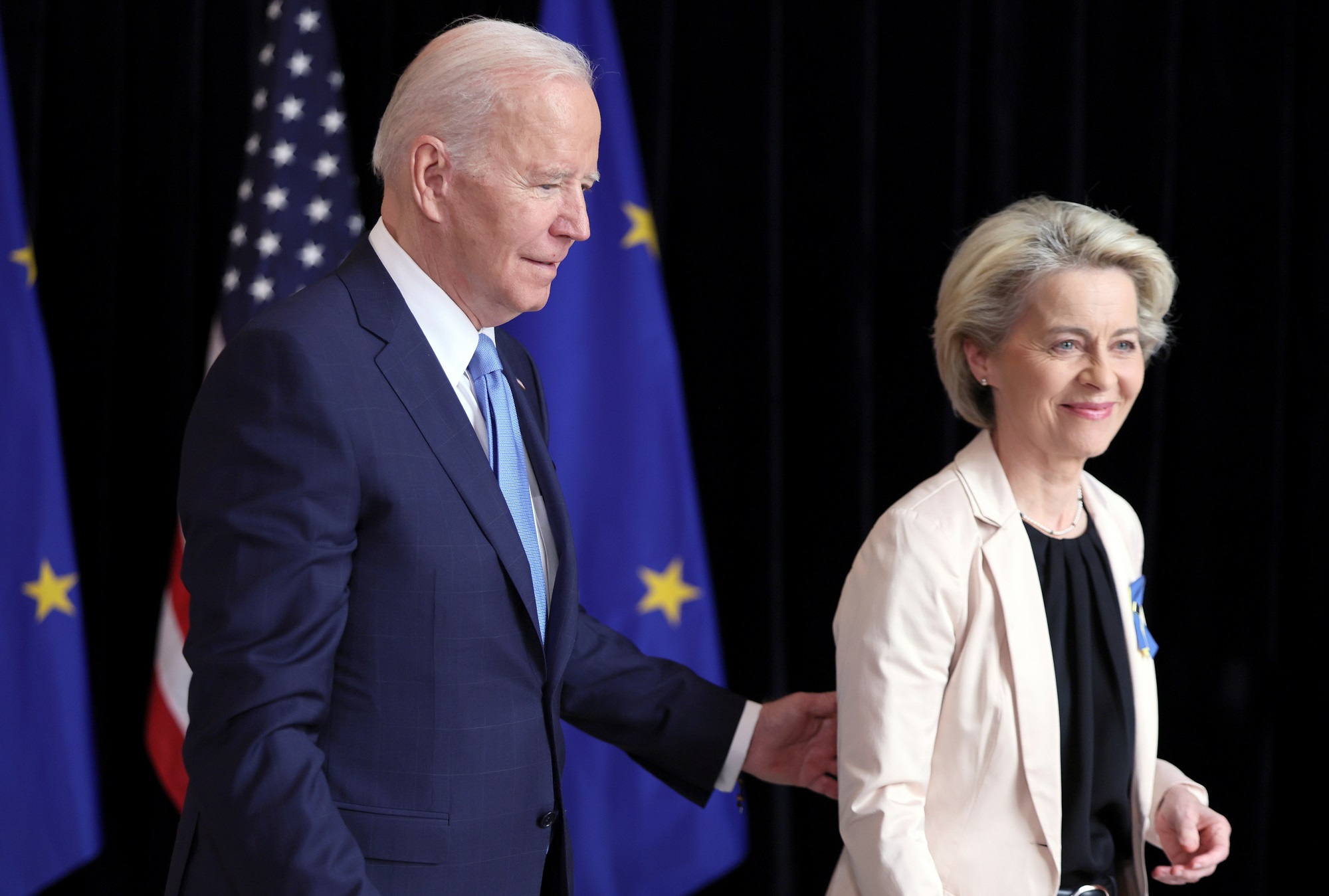
President Biden embarked on a crucial visit to Europe aimed at bolstering transatlantic alliances and addressing pressing global issues, marking a pivotal moment in his administration’s foreign policy agenda.
The trip, which took place from June 15 to June 20, 2024, included stops in several key European capitals, including Brussels, London, and Paris. At the forefront of discussions were efforts to reaffirm the United States’ commitment to NATO and strengthen cooperation with European allies on a range of diplomatic, economic, and security challenges.
One of the central themes of President Biden’s visit was reinforcing the transatlantic partnership in the face of emerging geopolitical threats, including Russia’s aggressive actions in Eastern Europe and China’s growing influence on the global stage. Biden underscored the importance of unity among Western democracies in addressing these challenges, emphasizing shared values of democracy, human rights, and international law.
President Biden participated in a NATO summit, where leaders discussed strategies to enhance collective defense capabilities, deterrence measures against potential adversaries, and cyber defense initiatives. The summit reaffirmed NATO’s role as the cornerstone of transatlantic security and emphasized the alliance’s commitment to adapting to evolving security threats.
In London, President Biden met with British Prime Minister and other senior officials to discuss bilateral relations, economic cooperation, and shared efforts to combat climate change. The discussions focused on deepening trade ties, advancing technological innovation, and promoting global health security in the wake of the COVID-19 pandemic.
In Paris, President Biden engaged in talks with French President Emmanuel Macron, highlighting the importance of Franco-American cooperation in addressing global challenges such as terrorism, climate change, and nuclear non-proliferation. The meetings underscored the longstanding alliance between the United States and France, while also addressing areas of strategic divergence, such as trade policies and defense cooperation.
Throughout the visit, President Biden reaffirmed the United States’ commitment to multilateralism and diplomacy, signaling a departure from the previous administration’s more unilateral approach to foreign affairs. He stressed the need for collective action and international cooperation to tackle shared global challenges effectively.
The trip also provided an opportunity for President Biden to promote his administration’s climate agenda on the global stage. He underscored the urgency of addressing climate change, announcing new initiatives to accelerate clean energy transition and strengthen international climate cooperation. The discussions in Europe laid the groundwork for the United States to reassert its leadership role in global climate efforts ahead of the upcoming COP30 conference.
Despite the diplomatic successes of the visit, challenges remain in maintaining unity and consensus among transatlantic allies on various issues, including trade policy, defense spending, and human rights. The Biden administration continues to navigate complex geopolitical dynamics while seeking to build a coalition of like-minded nations committed to advancing shared values and interests on the world stage.
President Biden’s visit to Europe underscored the enduring importance of transatlantic alliances in addressing global challenges and promoting international stability. By reaffirming America’s commitment to its European partners and engaging in substantive discussions on critical issues, Biden sought to strengthen diplomatic ties, foster cooperation, and shape a more secure and prosperous future for both sides of the Atlantic.
Biden Administration Proposes Budget Increase for Education and Healthcare
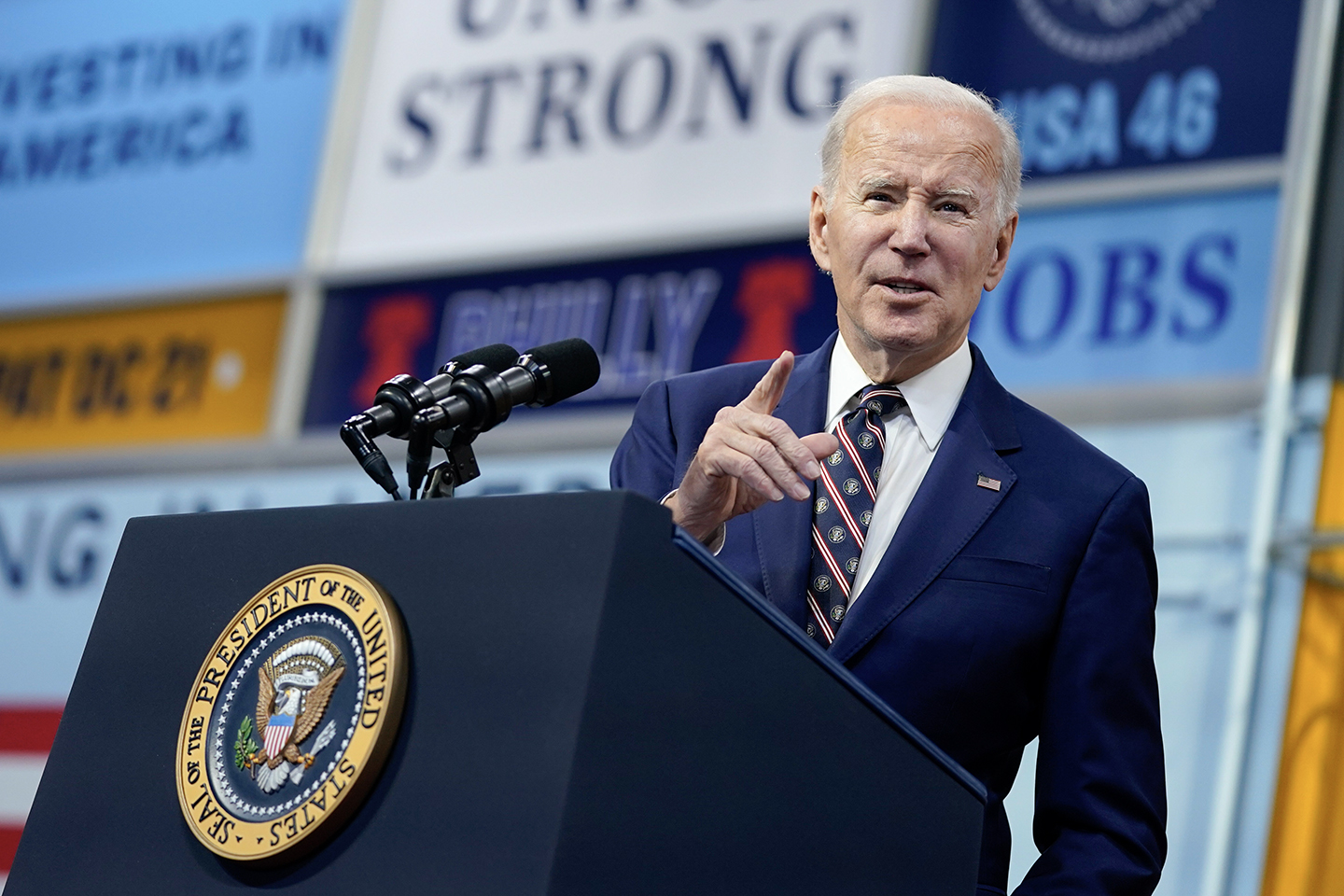
The Biden administration has put forth a comprehensive budget proposal for the fiscal year 2025 that includes significant increases in funding for education and healthcare, reflecting its priorities to invest in human capital and social welfare programs.
Education
Education funding is a cornerstone of President Biden’s budget proposal, aiming to address disparities in educational access and quality across the United States. The proposal includes:
Increase in K-12 Education Funding: The administration has proposed a $36 billion increase in funding for K-12 education programs. This funding is intended to support efforts to reduce class sizes, improve teacher salaries, and modernize school facilities, with a focus on equity and closing achievement gaps among students from different socioeconomic backgrounds.
Universal Pre-K Expansion: A key initiative in the budget proposal is the expansion of universal pre-kindergarten programs. The administration aims to provide access to high-quality pre-K education for all three- and four-year-olds, investing $15 billion to support states in expanding their early childhood education programs.
Higher Education Affordability: The budget proposal includes measures to make higher education more accessible and affordable. This includes increasing Pell Grants, which provide need-based financial aid to low-income students, and investing in community colleges to strengthen workforce development programs and reduce the cost of tuition for students pursuing higher education.
Support for Historically Black Colleges and Universities (HBCUs) and Minority-Serving Institutions: The administration has proposed significant investments in HBCUs and minority-serving institutions, aiming to enhance resources and support for these institutions that play a crucial role in educating underrepresented students.
Healthcare
Healthcare funding also features prominently in the Biden administration’s budget proposal, with a focus on expanding access to affordable healthcare services and addressing health disparities:
Affordable Care Act (ACA) Enhancements: The administration seeks to build on the Affordable Care Act by expanding subsidies to make health insurance more affordable for individuals and families. This includes increasing premium assistance and making coverage more accessible through state-based marketplaces.
Medicaid Expansion and Improvements: The budget proposal includes incentives for states to expand Medicaid coverage under the ACA, aiming to provide health insurance to millions of low-income Americans who currently lack coverage. Additionally, the administration proposes enhancements to Medicaid benefits and services to improve healthcare access and outcomes for Medicaid beneficiaries.
Mental Health and Substance Abuse Treatment: Addressing mental health and substance abuse is a priority in the budget proposal. The administration has allocated funding to expand access to mental health services, support substance abuse treatment programs, and invest in initiatives to reduce opioid addiction and overdose deaths.
Public Health Infrastructure: In response to lessons learned from the COVID-19 pandemic, the administration has proposed investments to strengthen public health infrastructure. This includes funding for disease surveillance, vaccine distribution, and preparedness for future public health emergencies.
President Biden’s budget proposal for fiscal year 2025 reflects his administration’s commitment to investing in education and healthcare as critical components of social and economic progress. By prioritizing funding increases in these areas, the administration aims to address systemic inequities, improve access to essential services, and promote inclusive economic growth. As the budget proposal undergoes congressional review and negotiations, its impact on education and healthcare policies will be closely watched, with potential implications for millions of Americans across the country.
Biden Condemns Surge in Gun Violence, Calls for National Action
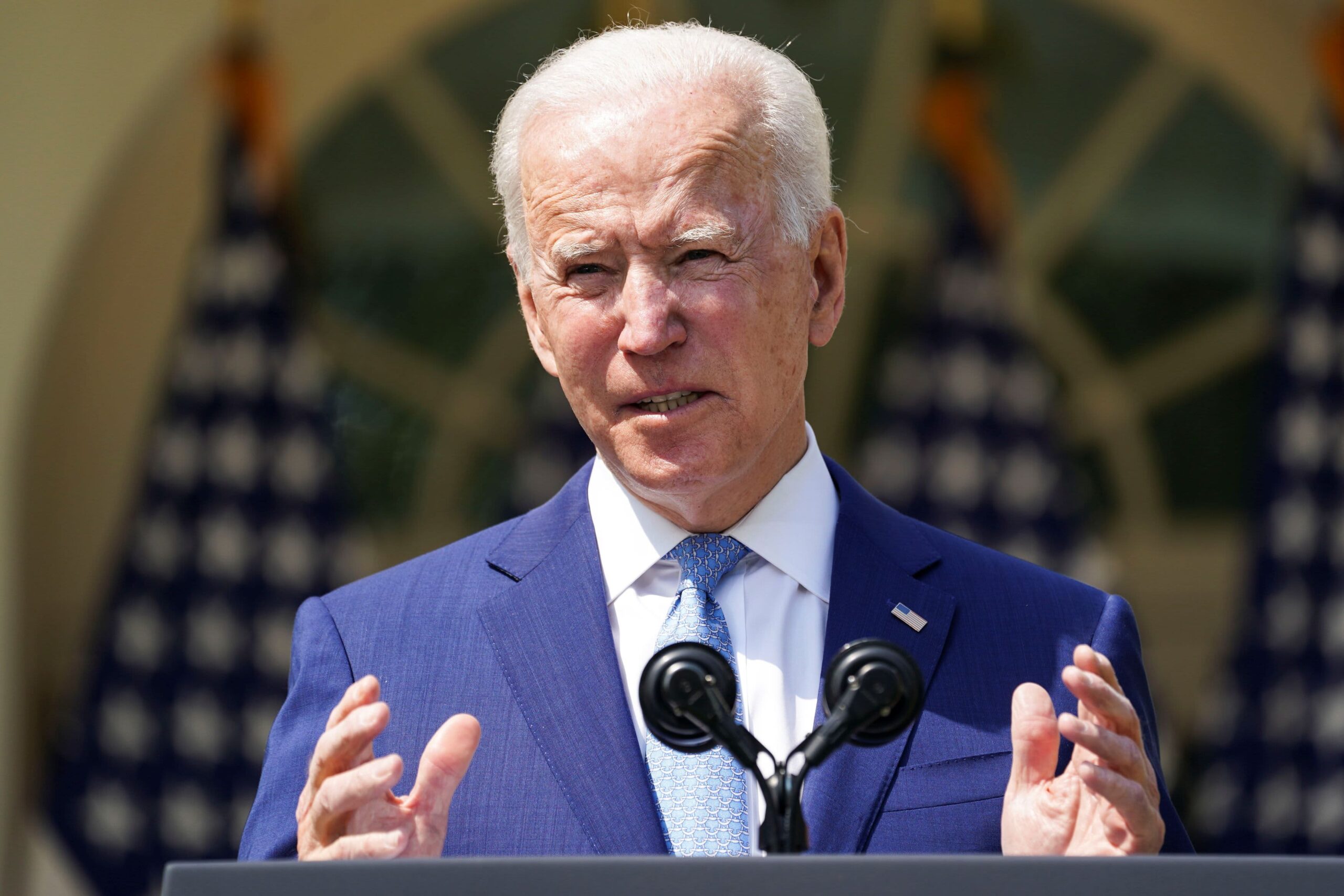
President Biden has forcefully condemned the surge in gun violence across the United States, calling for urgent national action to address the crisis and implement comprehensive measures aimed at curbing gun violence.
Current Situation
In recent years, gun violence has reached alarming levels in many American cities, with increases in homicides, shootings, and incidents of mass violence. Communities across the country have been deeply impacted by the toll of gun violence, affecting families, neighborhoods, and public safety.
President Biden’s Response
Addressing the Nation: President Biden has used his platform to address the nation and express his concern over the rising gun violence epidemic. He has emphasized the need for immediate action to prevent further loss of life and protect communities from gun violence.
Calls for Legislative Action: The Biden administration has called on Congress to pass legislation to strengthen gun laws and close loopholes that allow individuals to obtain firearms without thorough background checks. This includes advocating for universal background checks on all gun sales, including private transactions and gun shows.
Support for Community-Based Interventions: In addition to legislative measures, President Biden has endorsed community-based interventions to prevent gun violence. This includes investing in programs that address the root causes of violence, such as poverty, lack of educational opportunities, and access to mental health services.
Enhancing Law Enforcement Efforts: The administration has also focused on supporting law enforcement agencies in their efforts to combat illegal gun trafficking and prosecute individuals who illegally possess firearms. This includes providing resources for task forces targeting gun violence hotspots and implementing strategies to disrupt illegal gun markets.
Promoting Gun Safety Initiatives: President Biden has advocated for responsible gun ownership and promoted initiatives to enhance gun safety, such as safe storage practices and awareness campaigns to prevent accidental shootings, particularly involving children.
Opposition and Challenges
Despite President Biden’s calls for action, efforts to pass comprehensive gun control legislation face significant opposition in Congress, particularly from lawmakers who oppose stricter gun laws on constitutional grounds or argue that existing laws are sufficient.
President Biden’s condemnation of the surge in gun violence reflects a commitment to addressing one of the most pressing public safety challenges facing the nation. By advocating for legislative reforms, supporting community-based interventions, and enhancing law enforcement efforts, the administration aims to reduce gun violence and promote safer communities across the United States. However, achieving meaningful progress on this issue will require bipartisan cooperation, public support, and sustained efforts at both the federal and local levels to address the complex factors contributing to gun violence in America today.
President Biden Marks Milestone with 6 Months in Office, Highlights Achievements
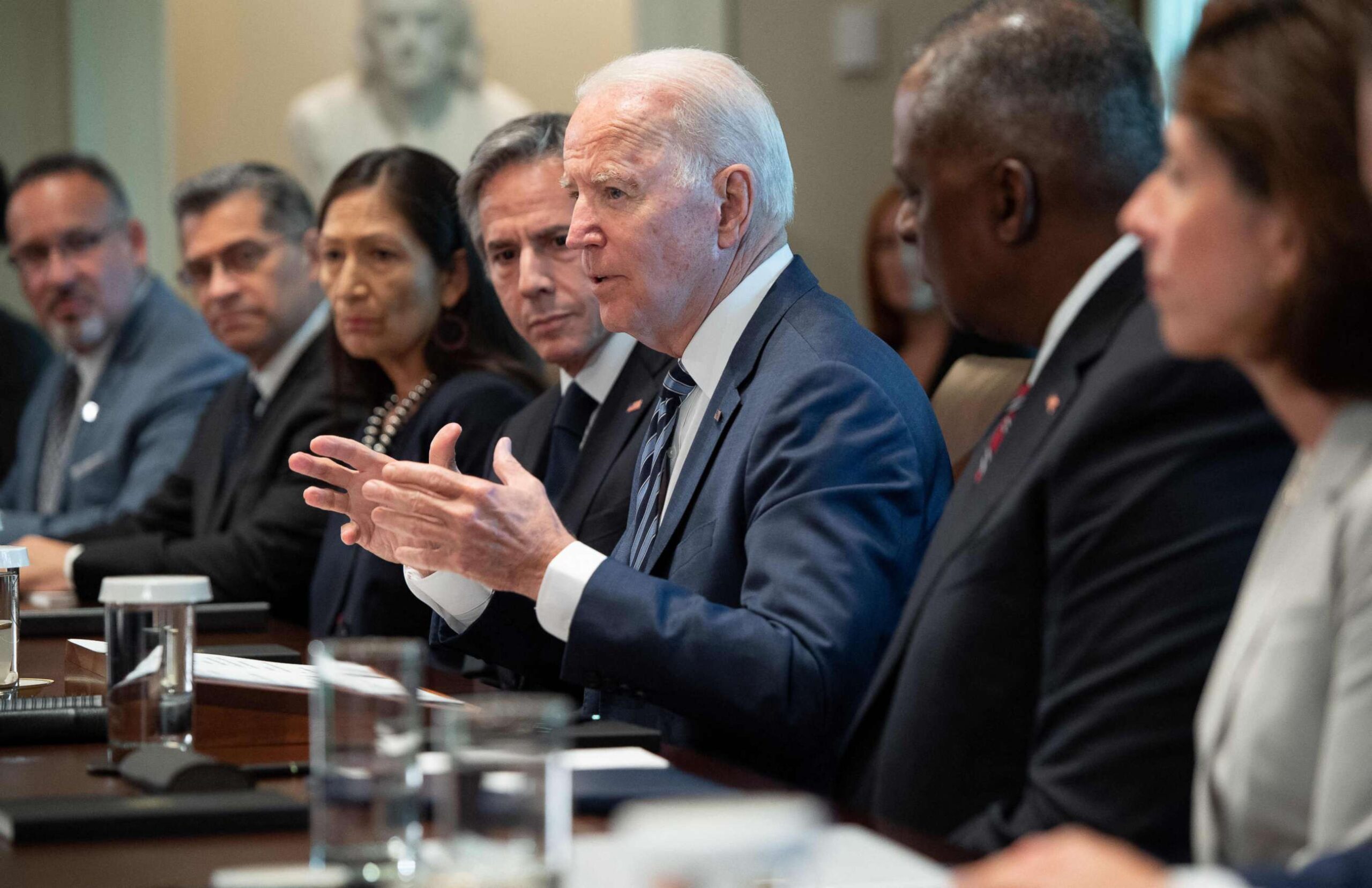
As President Biden reaches the milestone of six months in office, he has taken the opportunity to reflect on his administration’s achievements and outline priorities moving forward, amidst a backdrop of ongoing challenges and evolving policy initiatives.
Legislative Achievements
American Rescue Plan: Shortly after taking office, President Biden signed into law the American Rescue Plan Act, a $1.9 trillion economic stimulus package aimed at addressing the impacts of the COVID-19 pandemic. The plan provided direct relief payments to individuals and families, extended unemployment benefits, supported vaccine distribution efforts, and provided aid to state and local governments.
Infrastructure Investment: President Biden successfully advocated for the passage of the Infrastructure Investment and Jobs Act, a $1.2 trillion package aimed at modernizing America’s infrastructure. This legislation allocates funding for roads, bridges, public transit, broadband expansion, and clean energy initiatives, with a focus on creating jobs and improving economic competitiveness.
Economic Policies
Job Creation: The Biden administration has prioritized job creation and economic recovery, emphasizing investments in clean energy, manufacturing, and infrastructure projects as engines of growth. Efforts to stimulate job growth have been central to the administration’s economic agenda, aiming to rebuild the economy stronger than before the pandemic.
Tax Policies: President Biden has proposed tax reforms aimed at increasing revenue from corporations and high-income earners to fund investments in social programs and infrastructure. These proposals have been a source of debate in Congress, reflecting differing views on the role of government in economic policy and fiscal responsibility.
Healthcare and Social Programs
Healthcare Access: Building on the Affordable Care Act, the Biden administration has expanded access to healthcare coverage through increased subsidies and incentives for states to expand Medicaid. Efforts to address healthcare disparities and improve affordability have been central to the administration’s healthcare agenda.
Education: President Biden has prioritized investments in education, including proposals to expand access to pre-kindergarten education, increase funding for K-12 schools, and make college more affordable through expansions of Pell Grants and support for community colleges.
Climate and Environment
Climate Action: Recognizing the urgency of climate change, President Biden has rejoined the Paris Agreement and proposed ambitious climate goals, including a target of net-zero emissions by 2050. The administration has implemented regulations to promote clean energy development, reduce greenhouse gas emissions, and enhance environmental protections.
Foreign Policy and National Security
Transatlantic Relations: President Biden has sought to strengthen alliances with European and NATO partners, emphasizing collective security, democracy, and human rights. Efforts to repair and reaffirm America’s commitment to international agreements and multilateralism have been central to the administration’s foreign policy approach.
National Security: Addressing challenges from cyber threats to geopolitical tensions, the Biden administration has prioritized national security measures aimed at safeguarding American interests abroad and at home.
Challenges Ahead
Despite these achievements, the Biden administration faces significant challenges moving forward, including navigating a closely divided Congress, addressing partisan divides on key policy issues, and responding to ongoing crises such as the COVID-19 pandemic and its economic impacts. The administration’s ability to build consensus, implement its agenda, and deliver on campaign promises will be critical in shaping the remainder of President Biden’s term in office.
Conclusion
President Biden’s first six months in office have been marked by legislative accomplishments, economic initiatives, and efforts to address pressing domestic and international challenges. As the administration looks ahead, its focus remains on advancing policies that promote economic recovery, expand healthcare access, combat climate change, and strengthen America’s role on the global stage.
FAQs
Who is Joe Biden?
Joe Biden is the 46th President of the United States. He was elected in November 2020 and inaugurated on January 20, 2021.
What is President Biden’s background?
Joe Biden has a long career in public service. He served as a U.S. Senator from Delaware for over 30 years before becoming Vice President under President Barack Obama from 2009 to 2017.
What are President Biden’s key policy priorities?
President Biden’s key policy priorities include addressing the COVID-19 pandemic, promoting economic recovery, advancing racial equity, tackling climate change, expanding healthcare access, and strengthening alliances with international partners.
What is President Biden’s stance on healthcare?
President Biden supports expanding access to healthcare and building upon the Affordable Care Act (ACA). He has proposed measures to increase subsidies for health insurance, lower prescription drug prices, and expand Medicaid coverage.
What is President Biden’s plan for climate change?
President Biden has set ambitious goals to combat climate change, including rejoining the Paris Agreement and pledging to achieve net-zero greenhouse gas emissions by 2050. His administration has proposed investments in clean energy, infrastructure, and environmental protection.
How is President Biden handling foreign policy?
President Biden has emphasized rebuilding alliances with traditional allies and promoting diplomacy in international relations. He has addressed issues such as nuclear proliferation, cybersecurity, and human rights on the global stage.
What economic policies has President Biden implemented?
President Biden signed the American Rescue Plan Act, a COVID-19 relief package that provided direct payments to individuals, extended unemployment benefits, supported vaccine distribution, and provided aid to state and local governments. He has also advocated for infrastructure investments and tax reforms.
What is President Biden’s approach to immigration?
President Biden has proposed comprehensive immigration reform, including a pathway to citizenship for undocumented immigrants, reversing restrictive immigration policies, and addressing root causes of migration from Central America.
How does President Biden plan to address racial equity?
President Biden has prioritized advancing racial equity through policies aimed at addressing systemic racism in areas such as criminal justice, housing, healthcare, and economic opportunity. He has also promoted diversity in his administration’s appointments and initiatives.
What are President Biden’s plans for education?
President Biden has proposed investments in education, including expanding access to pre-kindergarten education, increasing funding for K-12 schools, supporting teachers, and making college more affordable through Pell Grants and tuition-free community college initiatives.


